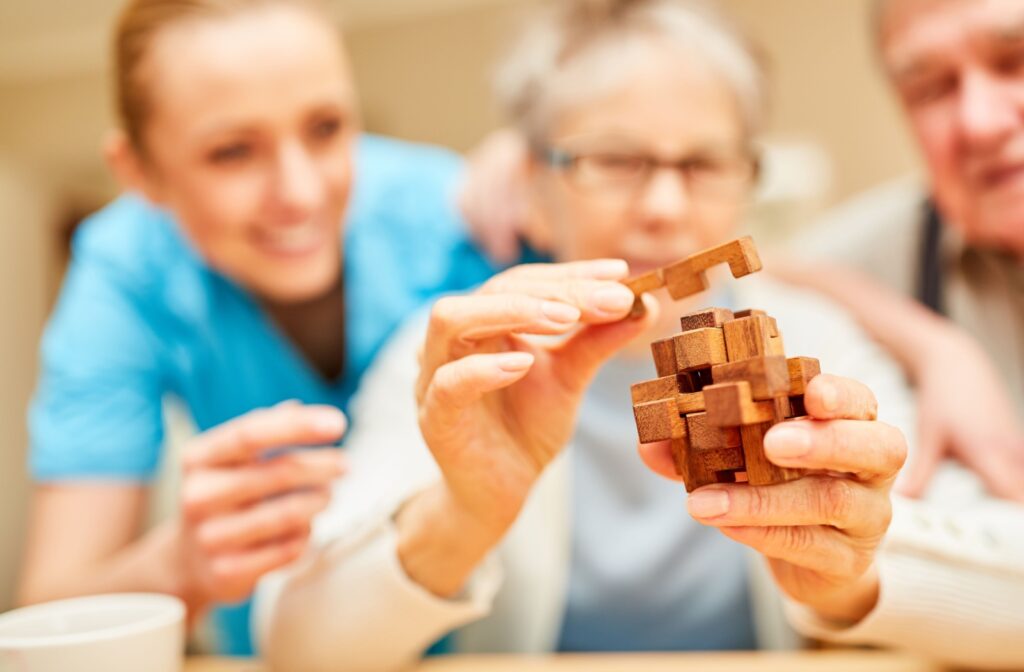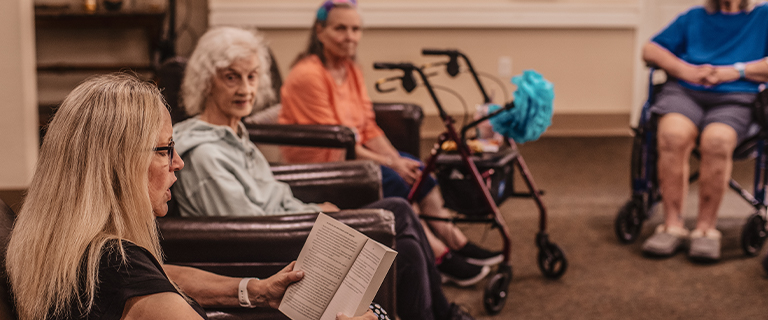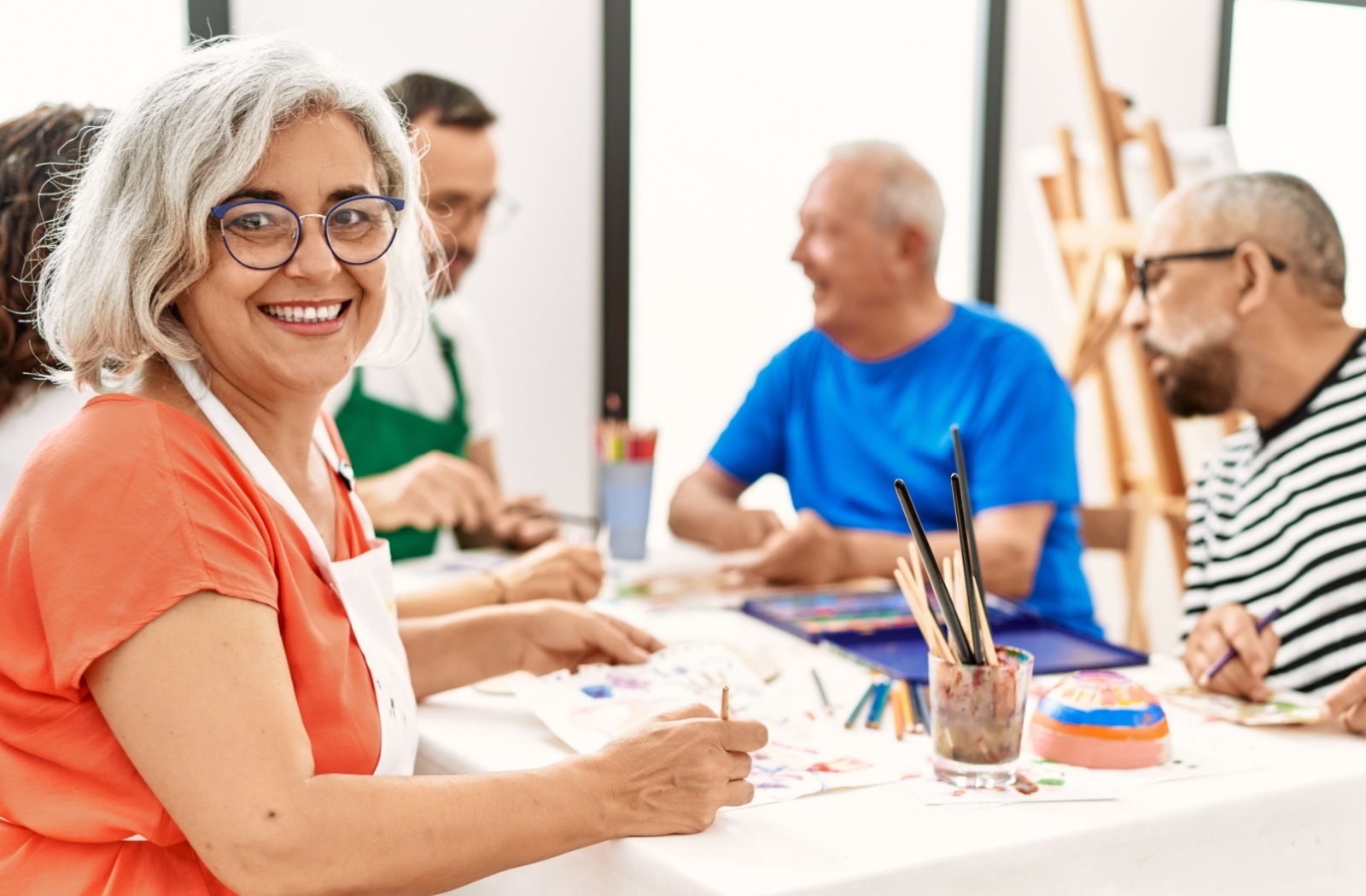Caring for a loved one with dementia is an intricate journey filled with both rewarding moments and challenging situations. The balance lies in providing day-to-day support while finding ways to enhance their mental wellness and overall happiness through engaging activities.
These activities can be incredibly fun and rewarding. They evoke positive emotions, preserve memories, and maintain cognitive functions, thereby significantly improving the quality of life for seniors with dementia.
Engaging activities for older adults with dementia include:
- Music therapy
- Arts and crafts
- Physical exercise
- Puzzles and games
- Reminiscence therapy
- Gardening
- Cooking and baking
The Importance of Engagement
Engagement through activities for people with dementia is more than just keeping them occupied. It’s about improving their well-being and cognitive abilities. Meaningful participation can uplift mood, lessen anxiety, and help maintain social connections, which are essential for mental health.
Music Therapy
Music therapy is a powerful tool in dementia care. Music’s ability to trigger memories and emotions is profound. Organizing regular music sessions, whether listening to their favorite songs or participating in group sing-alongs, can be incredibly uplifting for older adults.
Music engages various areas of the brain, often sparking memories and providing comfort and familiarity. To implement this, create a playlist of songs from different eras of your loved one’s life, or encourage playing simple instruments like tambourines or maracas to involve them actively.
Arts & Crafts
Arts and crafts provide a creative outlet and emotional expression. Activities like drawing, painting, or working with clay can enhance hand-eye coordination and are therapeutic. It allows older adults to express emotions that they might find difficult to put into words.
The focus here should be on the process rather than the outcome, encouraging creativity and providing a sense of achievement. Start with simple watercolors or coloring books designed for adults, which can be both calming and satisfying.
Physical Exercise
Exercise is crucial for maintaining health and can be adapted to different ability levels. Physical activities like chair yoga, tai chi, or guided stretching can improve flexibility, balance, and mood. These exercises can be done individually or in groups, offering social interaction and encouraging participation from peers.
Physical activity aids physical health and releases endorphins, which contribute to emotional well-being. Start with short sessions and gradually increase the duration as comfort and ability allow.
Puzzles & Games

Puzzles and games are excellent for cognitive stimulation. Board games, card games, and puzzles challenge the brain, improving concentration and problem-solving skills.
Choose games that match your loved one’s skill level to ensure they remain enjoyable and challenging. Simple jigsaw puzzles with large pieces or card games like matching can be both engaging and rewarding. These activities foster a sense of accomplishment, providing a boost to self-esteem and confidence.
Reminiscence Therapy
Reminiscence therapy involves discussing past experiences, often facilitated by photographs, music, or familiar objects. This activity helps older adults connect with their personal history and share stories, fostering a sense of identity and self-worth.
Family members can also participate, learning more about their loved ones and strengthening bonds. Put together items that hold special meaning, or use photo albums to spark conversations and recall cherished moments.
Gardening
Gardening offers a therapeutic and rewarding experience. Engaging with nature can be soothing, whether it’s planting flowers, tending to herbs, or simply watering plants.
Gardening encourages physical activity and provides a sense of purpose and accomplishment. Start with small projects, like planting herbs in pots or easy-to-care-for flowers, to make the activity manageable and enjoyable.
Cooking & Baking
For those who have enjoyed cooking in the past, participating in simple kitchen activities can be both fun and nostalgic. Tasks like decorating cookies or preparing a salad can stimulate the senses and evoke memories of past experiences.
Cooking allows older adults to engage in familiar routines, offering comfort and a sense of achievement. It is important to ensure safety by choosing tasks that do not involve sharp objects or hot appliances.
Finding the Right Fit
Selecting the right activities involves understanding each individual’s likes, dislikes, and capabilities. What works for one person may not suit another, and it’s essential to be patient and open to trial and error. Personalization ensures that the activities are beneficial and enjoyable, enhancing the overall experience for seniors with dementia.
A Sense of Community
Engaging in activities also fosters a sense of community and belonging. Group activities encourage social connections and offer emotional support for residents and their families.
If considering a senior living community, make sure it offers a variety of enrichment programs tailored to the needs of the person with dementia. Such programs can greatly enhance their quality of life, providing peace of mind for families knowing their loved ones are in a supportive environment.
Embracing Well-Being Through Active Engagement
Engaging with your loved one in these activities allows you to cherish moments of joy and connection, creating lasting memories. Reach out to our team at Parsons House Preston Hollow to learn more about the programs we offer and how we prioritize enriching activities for our residents. These programs not only enhance quality of life but also ensure a community where seniors can thrive with dignity and happiness.



